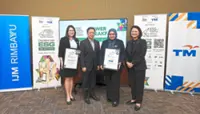CLIMATE change is no longer a looming threat – it is an active crisis reshaping our world and how we live in it. For Malaysia, the impacts are visible: intensifying storms and frequent flooding are already disrupting livelihoods.
As part of South-East Asia, a region especially vulnerable to climate change, Malaysia must act decisively to mitigate these risks while safeguarding economic growth.





